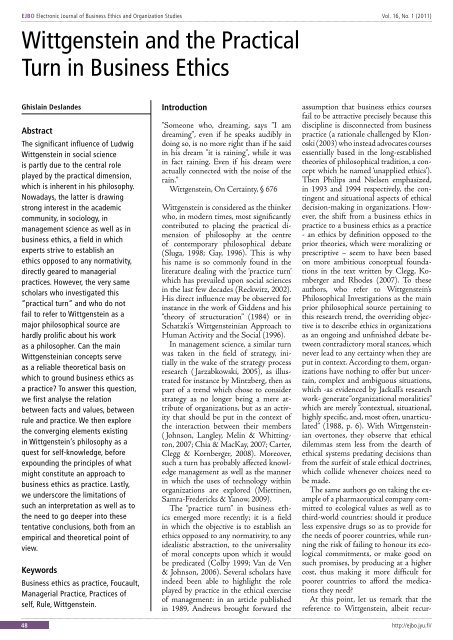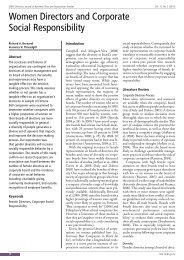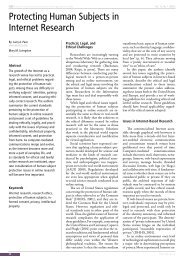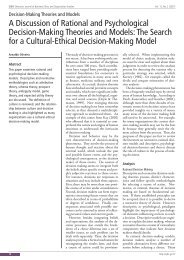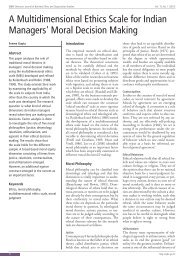View PDF - Electronic Journal of Business Ethics and Organization ...
View PDF - Electronic Journal of Business Ethics and Organization ...
View PDF - Electronic Journal of Business Ethics and Organization ...
- TAGS
- electronic
- ethics
- ejbo.jyu.fi
You also want an ePaper? Increase the reach of your titles
YUMPU automatically turns print PDFs into web optimized ePapers that Google loves.
EJBO <strong>Electronic</strong> <strong>Journal</strong> <strong>of</strong> <strong>Business</strong> <strong>Ethics</strong> <strong>and</strong> <strong>Organization</strong> Studies Vol. 16, No. 1 (2011)<br />
Wittgenstein <strong>and</strong> the Practical<br />
Turn in <strong>Business</strong> <strong>Ethics</strong><br />
Ghislain Desl<strong>and</strong>es<br />
Abstract<br />
The significant influence <strong>of</strong> Ludwig<br />
Wittgenstein in social science<br />
is partly due to the central role<br />
played by the practical dimension,<br />
which is inherent in his philosophy.<br />
Nowadays, the latter is drawing<br />
strong interest in the academic<br />
community, in sociology, in<br />
management science as well as in<br />
business ethics, a field in which<br />
experts strive to establish an<br />
ethics opposed to any normativity,<br />
directly geared to managerial<br />
practices. However, the very same<br />
scholars who investigated this<br />
“practical turn” <strong>and</strong> who do not<br />
fail to refer to Wittgenstein as a<br />
major philosophical source are<br />
hardly prolific about his work<br />
as a philosopher. Can the main<br />
Wittgensteinian concepts serve<br />
as a reliable theoretical basis on<br />
which to ground business ethics as<br />
a practice? To answer this question,<br />
we first analyse the relation<br />
between facts <strong>and</strong> values, between<br />
rule <strong>and</strong> practice. We then explore<br />
the converging elements existing<br />
in Wittgenstein’s philosophy as a<br />
quest for self-knowledge, before<br />
expounding the principles <strong>of</strong> what<br />
might constitute an approach to<br />
business ethics as practice. Lastly,<br />
we underscore the limitations <strong>of</strong><br />
such an interpretation as well as to<br />
the need to go deeper into these<br />
tentative conclusions, both from an<br />
empirical <strong>and</strong> theoretical point <strong>of</strong><br />
view.<br />
Keywords<br />
<strong>Business</strong> ethics as practice, Foucault,<br />
Managerial Practice, Practices <strong>of</strong><br />
self, Rule, Wittgenstein.<br />
Introduction<br />
"Someone who, dreaming, says "I am<br />
dreaming”, even if he speaks audibly in<br />
doing so, is no more right than if he said<br />
in his dream "it is raining", while it was<br />
in fact raining. Even if his dream were<br />
actually connected with the noise <strong>of</strong> the<br />
rain."<br />
Wittgenstein, On Certainty, § 676<br />
Wittgenstein is considered as the thinker<br />
who, in modern times, most significantly<br />
contributed to placing the practical dimension<br />
<strong>of</strong> philosophy at the centre<br />
<strong>of</strong> contemporary philosophical debate<br />
(Sluga, 1998; Gay, 1996). This is why<br />
his name is so commonly found in the<br />
literature dealing with the ‘practice turn’<br />
which has prevailed upon social sciences<br />
in the last few decades (Reckwitz, 2002).<br />
His direct influence may be observed for<br />
instance in the work <strong>of</strong> Giddens <strong>and</strong> his<br />
“theory <strong>of</strong> structuration” (1984) or in<br />
Schatzki’s Wittgensteinian Approach to<br />
Human Activity <strong>and</strong> the Social (1996).<br />
In management science, a similar turn<br />
was taken in the field <strong>of</strong> strategy, initially<br />
in the wake <strong>of</strong> the strategy process<br />
research ( Jarzabkowski, 2005), as illustrated<br />
for instance by Mintzberg, then as<br />
part <strong>of</strong> a trend which chose to consider<br />
strategy as no longer being a mere attribute<br />
<strong>of</strong> organizations, but as an activity<br />
that should be put in the context <strong>of</strong><br />
the interaction between their members<br />
( Johnson, Langley, Melin & Whittington,<br />
2007; Chia & MacKay, 2007; Carter,<br />
Clegg & Kornberger, 2008). Moreover,<br />
such a turn has probably affected knowledge<br />
management as well as the manner<br />
in which the uses <strong>of</strong> technology within<br />
organizations are explored (Miettinen,<br />
Samra-Fredericks & Yanow, 2009).<br />
The “practice turn” in business ethics<br />
emerged more recently; it is a field<br />
in which the objective is to establish an<br />
ethics opposed to any normativity, to any<br />
idealistic abstraction, to the universality<br />
<strong>of</strong> moral concepts upon which it would<br />
be predicated (Colby 1999; Van de Ven<br />
& Johnson, 2006). Several scholars have<br />
indeed been able to highlight the role<br />
played by practice in the ethical exercise<br />
<strong>of</strong> management: in an article published<br />
in 1989, Andrews brought forward the<br />
assumption that business ethics courses<br />
fail to be attractive precisely because this<br />
discipline is disconnected from business<br />
practice (a rationale challenged by Klonoski<br />
(2003) who instead advocates courses<br />
essentially based in the long-established<br />
theories <strong>of</strong> philosophical tradition, a concept<br />
which he named ‘unapplied ethics’).<br />
Then Philips <strong>and</strong> Nielsen emphasized,<br />
in 1993 <strong>and</strong> 1994 respectively, the contingent<br />
<strong>and</strong> situational aspects <strong>of</strong> ethical<br />
decision-making in organizations. However,<br />
the shift from a business ethics in<br />
practice to a business ethics as a practice<br />
- an ethics by definition opposed to the<br />
prior theories, which were moralizing or<br />
prescriptive – seem to have been based<br />
on more ambitious conceptual foundations<br />
in the text written by Clegg, Kornberger<br />
<strong>and</strong> Rhodes (2007). To these<br />
authors, who refer to Wittgenstein’s<br />
Philosophical Investigations as the main<br />
prior philosophical source pertaining to<br />
this research trend, the overriding objective<br />
is to describe ethics in organizations<br />
as an ongoing <strong>and</strong> unfinished debate between<br />
contradictory moral stances, which<br />
never lead to any certainty when they are<br />
put in context. According to them, organizations<br />
have nothing to <strong>of</strong>fer but uncertain,<br />
complex <strong>and</strong> ambiguous situations,<br />
which -as evidenced by Jackall’s research<br />
work- generate “organizational moralities”<br />
which are merely “contextual, situational,<br />
highly specific, <strong>and</strong>, most <strong>of</strong>ten, unarticulated”<br />
(1988, p. 6). With Wittgensteinian<br />
overtones, they observe that ethical<br />
dilemmas stem less from the dearth <strong>of</strong><br />
ethical systems predating decisions than<br />
from the surfeit <strong>of</strong> stale ethical doctrines,<br />
which collide whenever choices need to<br />
be made.<br />
The same authors go on taking the example<br />
<strong>of</strong> a pharmaceutical company committed<br />
to ecological values as well as to<br />
third-world countries: should it produce<br />
less expensive drugs so as to provide for<br />
the needs <strong>of</strong> poorer countries, while running<br />
the risk <strong>of</strong> failing to honour its ecological<br />
commitments, or make good on<br />
such promises, by producing at a higher<br />
cost, thus making it more difficult for<br />
poorer countries to afford the medications<br />
they need?<br />
At this point, let us remark that the<br />
reference to Wittgenstein, albeit recur-<br />
48 http://ejbo.jyu.fi/


